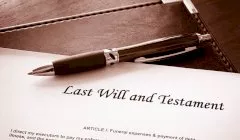Retirement
What is estate planning
What exactly is estate planning? Read on to learn why it’s important and should be top of your to-do list.
What is estate planning
There is a common misconception that you have to be rich in order to have an estate plan. While most of us are familiar with leaving a will when we pass away, there is still a large percentage of Australians who do not have one. It’s no surprise then that drafting an estate plan is even lower on the list of things we prioritise when financial planning.
So, let’s set the record straight: you don’t need to be wealthy to create an estate plan. Your estate includes everything you own, and it can be any size.
“People are often good at ensuring they have things like house and car insurance in place, but we know this does not extend to wills,” said Andrew Simpson, national head of wills and estates law at Maurice Blackburn Lawyers. A recent study by the firm showed that almost 40 per cent of Australians indicated that they have no idea what would happen to their assets if they pass away.
Though often overlooked or put off in favor of more immediate concerns, a comprehensive estate plan will ensure that your assets and investments will be properly distributed and your loved ones are provided for in your absence.
In this article, we’ll discuss what is estate planning and why drafting one should be on your to-do list.
What encompasses my ‘estate’?
A person’s estate consists of all property and assets you own at the time of your death, which includes the following:
- Real estate (property, land, buildings)
- Personal property (automobiles, jewelry, collectibles, artwork, furnishings)
- Bank accounts and savings
- Financial securities and assets (bonds, stocks, cash etc)
- Life insurance policies
What about your superannuation fund? Is it considered part of your estate? As a general rule, superannuation is an asset excluded from your will. A federal court’s decision on a related case clarified that a super does not form part of an estate and is therefore not subject to the terms of a will. But there are steps you can take to ensure that your super will be taken into consideration when you are creating your estate plan. To learn more, read here.
What is estate planning?
Estate planning is the process of developing a plan on how your asset will be distributed among your beneficiaries upon your death. Additionally, it includes provisions on how your family members or designated beneficiary or trustee will access or control your assets should you become unable to do so yourself.
A comprehensive estate plan will also cover a range of other matters, including the following:
- Making a will. A will is an official document that states how your assets will be distributed when you pass away. A watertight will is the key to successful estate planning and it’s usually advised to seek legal counsel when drafting one.
- Creating a testamentary trust. A testamentary trust is a trust established by your will and does not come into effect until after your death. There are several types of testamentary trusts, but it is usually a trust where the trustee has full control about allocating your assets to your beneficiaries.
- Powers of attorney. A power of attorney is a legal document that allows you to nominate someone you trust to make important decisions on your behalf if you are unable to do so. This endows the trusted person authority with the power to make personal, financial and lifestyle decisions for you in the occurrence of an event such as disability, death or incompetence. Depending on state and territory laws, as well as your circumstances, a power of attorney can operate in different ways.
- Designating power of guardianship. An estate plan will name a guardian (and a backup guardian, if needed) for your children. This will give them the power to make personal and lifestyle decisions for you if you pass away or lose your mental capacity. This can help avoid costly family court fights that could drain your estate’s assets.
- Making health directives. Instructions on your wishes regarding medical treatment if you're unable to communicate are also usually included in an estate plan. A medical care directive (also known as a living will) contains details of how you wish to be medically cared for if you become unable to make those decisions yourself. You can also give a trusted person the medical power of attorney for your healthcare. These two documents are sometimes combined into one, known as an advanced healthcare directive.
To have a deeper insight into these topics, read here.
How do I get started?
The estate planning process can be broken down into a few simple steps. Here is an overview.
- Make an inventory of your assets. Create a list of your assets. You can start by identifying your tangible and intangible assets that form part of your estate. Once you have a list of your assets, you will need to estimate their value. For some assets, you can use outside valuations such as recent property valuation or statements from your financial accounts.
- Identify risks. To have a good estate plan, you need to identify any potential risks before and after your death. This includes divorce, mental incapacity or your early mortality.
- Account for your beneficiaries’ needs and circumstances. Once you are familiar with what is in your estate and what risks you should plan around, you should then consider how you can protect the assets and your family after you pass away. Do you have enough life insurance? Who is fit to be my children’s guardian? You should also think about who you don’t want your assets going to and how you’ll deal with those individuals.
- Create a plan. You can now work with your solicitor, accountant and financial planner to work out an estate plan that is tailored to your needs and incorporates all your assets. For help developing a comprehensive estate plan that covers all necessary issues, it’s recommended that you seek independent legal advice. You must be over 18 and mentally competent when you draw up your estate plan.
What could happen if I don’t plan ahead?
It’s not a happy topic to think about, but what if you don’t take the time to do your estate planning? Here are some of the worst-case scenarios if you fail to do so:
- Wrongful distribution of assets – If you die without a will or with an invalid will, this is known as dying intestate. Each state and territory has its own laws regarding how your assets will be distributed if this happens. Without an estate plan, your property will be distributed according to the state or territory’s laws of intestacy, which generally prioritises spouses, children and parents. While this outcome is generally acceptable, this allocation may go against your final wishes.
- Delay – A delay in distribution means that your family or beneficiaries can’t get the money and assets immediately after you pass away. This can cause inconveniences for your family, who might require immediate financial support after your death. Additionally, if you have children, they may not get the proper care they need if they are entrusted with the wrong person or institution and the final decision on who will raise them is still up for the court’s decision.
- Disputes – We’ve all heard the horror stories. Someone in the family with a significant estate dies and the war between family members starts. One child may think they deserve a lion’s share of the estate or one child may think they should be in charge of the finances even though they’re notorious for being careless with their finances. Tensions will inevitably rise if it’s not clear who gets what, and the dispute can end up in court, with family members fighting against one another. Not only will this have an emotional toll on your loved ones, it may rack up significant legal fees.
Conclusion
Estate planning is an important aspect of your financial plan and shouldn’t be a last-minute task. A comprehensive estate plan will ensure that your assets and investments are properly distributed to your family or beneficiaries in the most efficient and hassle-free way possible.
While many of us don’t enjoy talking about end-of-life subjects like wills and estates, it’s important to overcome this mental obstacle and view estate planning as an integral part of your overall financial plan. When it comes right down to it, the process is about making sure your wealth and investments are handed down to your family or beneficiaries in the most effective way possible. Not to mention that failure to plan will also place a heavy burden on your loved ones during a difficult time.

Estate planning
Turning inheritance into impact: The once-in-a-generation opportunity facing Australian families
Australia is on the brink of a seismic shift in wealth distribution, with more than $3.5 trillion expected to be transferred from Baby Boomers to Gen X and Millennials in the next two decades. This ...Read more

Estate planning
Australians encouraged to review their estate plans
Individuals should make sure their current estate plan is up to date. Read more

Estate planning
Why would a person want to set up a trust?
Why would a person want to set up a trust? We list down the reasons that may motivate you to call your attorney today. Read more

Estate planning
Will v trust: Which is best for you?
Should you create a will or a trust? Learn about their differences to know which is the best option for your estate planning. Read more

Estate planning
Executor of will and power of attorney: What’s the difference?
What is the difference between an executor of will and power of attorney? Let’s discuss their roles and why they are both important tools in estate planning. Read more

Estate planning
When is the best time to start estate planning?
One of the biggest misconceptions about estate planning is that you should start developing one only when you’re old. We discuss why you should create one as soon as you can. Read more

Estate planning
Advisers warned on limitations with life expectancy estimates
Jeremy Cooper has highlighted some of the limitations in using average life expectancies when planning retirement income for individual SMSF clients. Read more

Estate planning
Deadly estate planning mistakes and how to overcome them
Estate planning can be a complex process. Here are some of the mistakes you should avoid when getting your affairs in order. Read more

Estate planning
Turning inheritance into impact: The once-in-a-generation opportunity facing Australian families
Australia is on the brink of a seismic shift in wealth distribution, with more than $3.5 trillion expected to be transferred from Baby Boomers to Gen X and Millennials in the next two decades. This ...Read more

Estate planning
Australians encouraged to review their estate plans
Individuals should make sure their current estate plan is up to date. Read more

Estate planning
Why would a person want to set up a trust?
Why would a person want to set up a trust? We list down the reasons that may motivate you to call your attorney today. Read more

Estate planning
Will v trust: Which is best for you?
Should you create a will or a trust? Learn about their differences to know which is the best option for your estate planning. Read more

Estate planning
Executor of will and power of attorney: What’s the difference?
What is the difference between an executor of will and power of attorney? Let’s discuss their roles and why they are both important tools in estate planning. Read more

Estate planning
When is the best time to start estate planning?
One of the biggest misconceptions about estate planning is that you should start developing one only when you’re old. We discuss why you should create one as soon as you can. Read more

Estate planning
Advisers warned on limitations with life expectancy estimates
Jeremy Cooper has highlighted some of the limitations in using average life expectancies when planning retirement income for individual SMSF clients. Read more

Estate planning
Deadly estate planning mistakes and how to overcome them
Estate planning can be a complex process. Here are some of the mistakes you should avoid when getting your affairs in order. Read more










